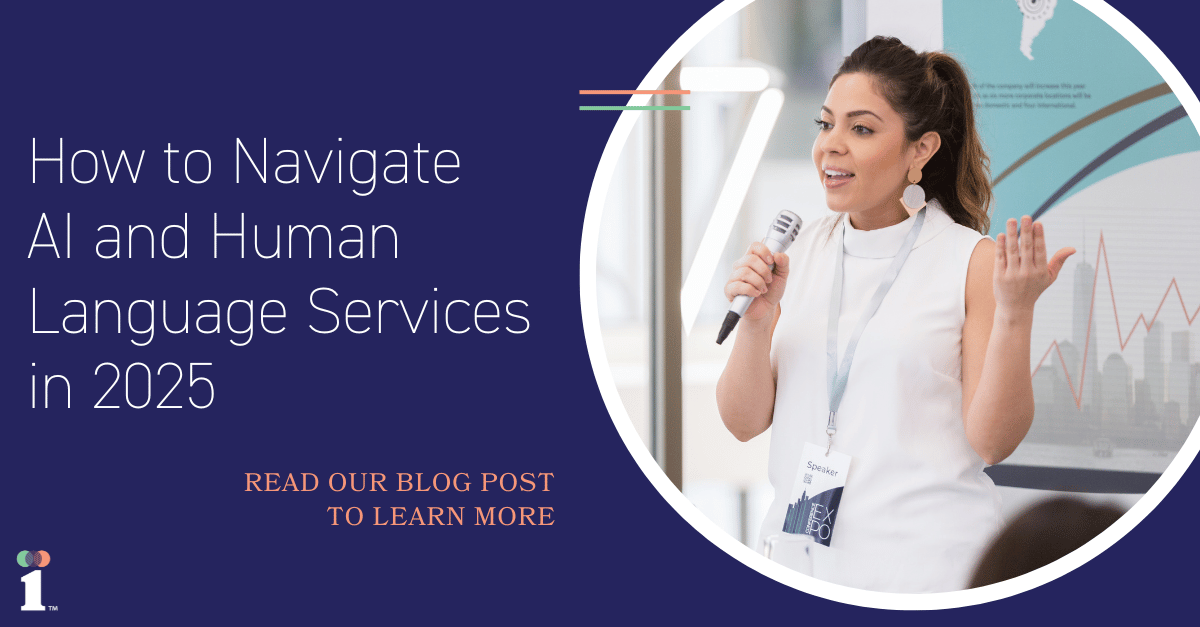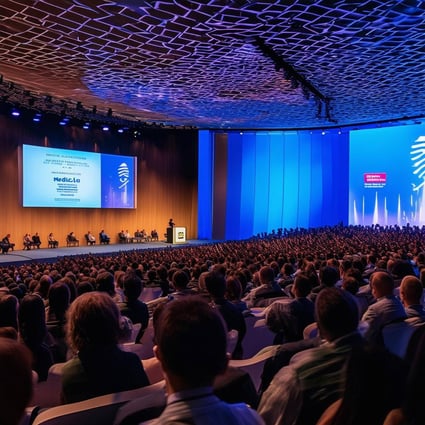
2025 promises to be a year of significant advancements in language services, driven by the increasing integration of artificial intelligence (AI) and Large Language Models (LLMs). Top experts in the field predict that AI-powered translation tools will achieve even higher levels of accuracy and fluency by capturing the complex, contextual nature of language.
In 2024, we have seen advancements in AI speech translation, a real-time language translation solution for live events. At Interprenet, we have already helped many organizations use AI speech translation to enable seamless communication across language barriers in various environments, such as business conferences and virtual events.
And despite the AI trend, we continue to provide human-powered interpretation as our core service for a range of industries and use cases that don’t rely on AI for various reasons. In 2025, AI will continue to dominate the headlines. However, in our experience we see real benefits for live events and meetings when you know when to opt for a human interpreter and when to use AI Speech Translation.
The future of multilingual events and meetings is not a clear-cut “either/or” choice between an AI-powered language solution and human language expertise.
Clients looking for language solutions come to us for advice on the best solution mix for their needs. This is because every use case is different and a one-size-fits-all solution simply won't deliver the results that meet the client's expectations.

So how do you navigate the complexity of language services in 2025 and beyond?
Interprenet is a full-service language provider, and our strength lies in tailoring language solutions to each client’s needs and setup. Whether to use AI Speech Translation or not depends on several factors.
To help you make informed decisions between AI Speech Translation, human interpretation, or a combination of both, we recommend considering the following factors:
1. Complexity and Specialization of the Meeting Topic:
Does your event involve complex or specialized subject matter with technical terminology or industry-specific jargon? We can prepare our AI Speech Translation solution with a custom glossary ahead of the event to increase translation accuracy. However, if the margin for potential errors needs to be kept as low as possible, human interpreters may be better suited to accurately convey nuances and details.
2. Expectations in Terms of Accuracy:
Assess the level of accuracy required for the language services. While AI Speech Translation can provide quick and cost-effective translations, human interpreters may offer higher levels of precision and can adapt to the tone, pace, and cultural nuances of speakers, particularly in high-stakes or sensitive communication contexts.
3. Languages and Regional Specificity:
Consider the languages needed for the event and whether specific accents or regional dialects are required. Our AI Speech Translation solution covers 80+ languages, including all UN languages, almost all EU languages and the most common Asian languages. Our human interpreters cover more than 300 languages, including rare languages.
4. Usage Frequency:
Determine the frequency at which language services will be utilized. For recurring or ongoing language support needs, AI Speech Translation may offer a more scalable and efficient solution, while human interpretation can cater to one-time or sporadic events.
5. Number of Attendees Using the Service:
Evaluate the scale of language support required based on the number of attendees. For larger events with a diverse audience, human interpreters may offer personalized and adaptable language services to ensure effective communication for all participants.
6. Interactivity of the Meeting or Event:
Consider the degree of interactivity within the event. If the meeting involves highly interactive discussions, audience participation, or Q&A sessions, human interpreters can adapt to the dynamic nature of the event, whereas AI Speech Translation may excel in one-way presentations or speeches.
The benefits of working with a trusted language service provider
At Interprenet, we help our clients assess their event requirements, including language diversity, content complexity, and audience needs, to determine the most suitable language services. When optimizing language services for your individual requirements, we consider budget, time constraints and the technical capabilities of AI speech translation versus human interpretation.
As a rule of thumb, we recommend the following: The more complex your event, the more you will benefit from a customized and professional service like the one Interprenet offers.
Let's take two examples of complex events that could benefit from a customized combination of human interpretation and AI speech translation:
 Example 1: International Medical Conference
Example 1: International Medical Conference
Event Setup: Hybrid (In-Person and Online)
- Let’s assume the conference is designed to accommodate both in-person attendance as well as virtual participation via a live-streamed platform. It includes keynote presentations, panel discussions, and live demonstrations.
Language Service Needs:
- Audience Members: Approximately 500 in-person attendees and 1000 virtual participants.
- Languages: English is the floor language. Many of the attendees will require Spanish interpretation. Only a handful of attendees will require Mandarin and French interpretation.
Language Service Solution:
- Human interpreters provide remote simultaneous interpretation into Spanish for all sessions to attendees at the venue and online.
- AI Speech Translation will be used for Mandarin and French since the number of attendees requiring interpretation is so small that it doesn’t justify the cost of a human interpreter. AI Speech Translation can be delivered to attendees at the venue and those listening online.
 Example 2: Global Business Summit
Example 2: Global Business Summit
Event Setup: In-Person
- The summit brings together international business leaders, government officials, and industry experts, creating an environment for networking, deal-making, and collaboration.
Language Service Needs:
- Audience Members: Approximately 800 attendees from various countries, including delegates, executives, and high-profile guests.
- Languages: English is the floor language. Many attendees’ first language is French, German, Japanese, or Mandarin. While attendees have a good command of the English language, they prefer to follow along in their native language.
- Main stage: Keynote presentations
- Breakout Rooms: Multiple breakout sessions covering specific business sectors and investment opportunities are planned.
Language Service Solution:
- AI Speech Translation and AI Captions will be available for the main stage keynote presentations via the mobile app, providing translations for individual attendees who prefer to follow along in their native language.
- Human interpreters will be deployed onsite for consecutive interpretation during small breakout sessions, ensuring the accuracy and fluency required for complex negotiations and strategic conversations.
In both examples, the combination of AI speech translation and human interpretation allows for a comprehensive approach to language services, addressing the diverse needs of complex live events with multiple languages, large audiences, and interactive components. This hybrid language service model ensures inclusive communication and effective collaboration for participants across different event setups and scenarios.



